A Research on Knowledge Management at FlightCenter Travel Group
VerifiedAdded on 2022/10/12
|19
|3270
|105
Report
AI Summary
This report presents a comprehensive research study on knowledge management practices at FlightCentre Travel Group (FCTG), focusing on the FlightCentre brand within the Brisbane area. The research investigates the factors contributing to poor knowledge management, including people and processes, organizational structure, and technology. The study utilized employee surveys and data analysis to identify key issues, such as a lack of knowledge sharing, competition among teams, and inadequate technology support for knowledge management. The findings reveal that the organization suffers from poor knowledge management, with employees reporting challenges in accessing and utilizing information effectively. The discussion section analyzes the findings, linking them to the research questions and relevant literature, highlighting the need for improved knowledge sharing strategies, a supportive organizational culture, and enhanced technology infrastructure to address the identified issues and improve customer retention.
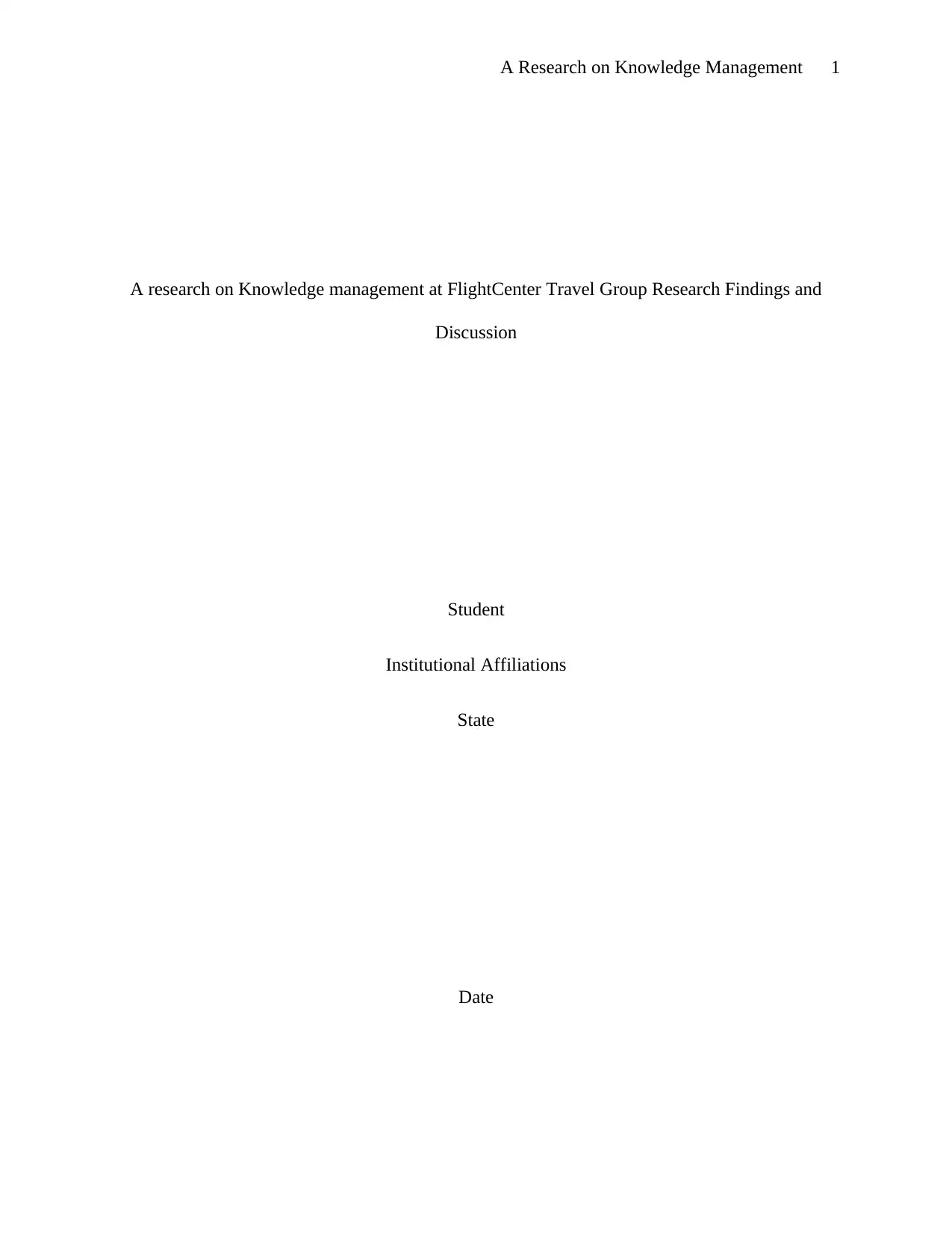
A Research on Knowledge Management 1
A research on Knowledge management at FlightCenter Travel Group Research Findings and
Discussion
Student
Institutional Affiliations
State
Date
A research on Knowledge management at FlightCenter Travel Group Research Findings and
Discussion
Student
Institutional Affiliations
State
Date
Paraphrase This Document
Need a fresh take? Get an instant paraphrase of this document with our AI Paraphraser
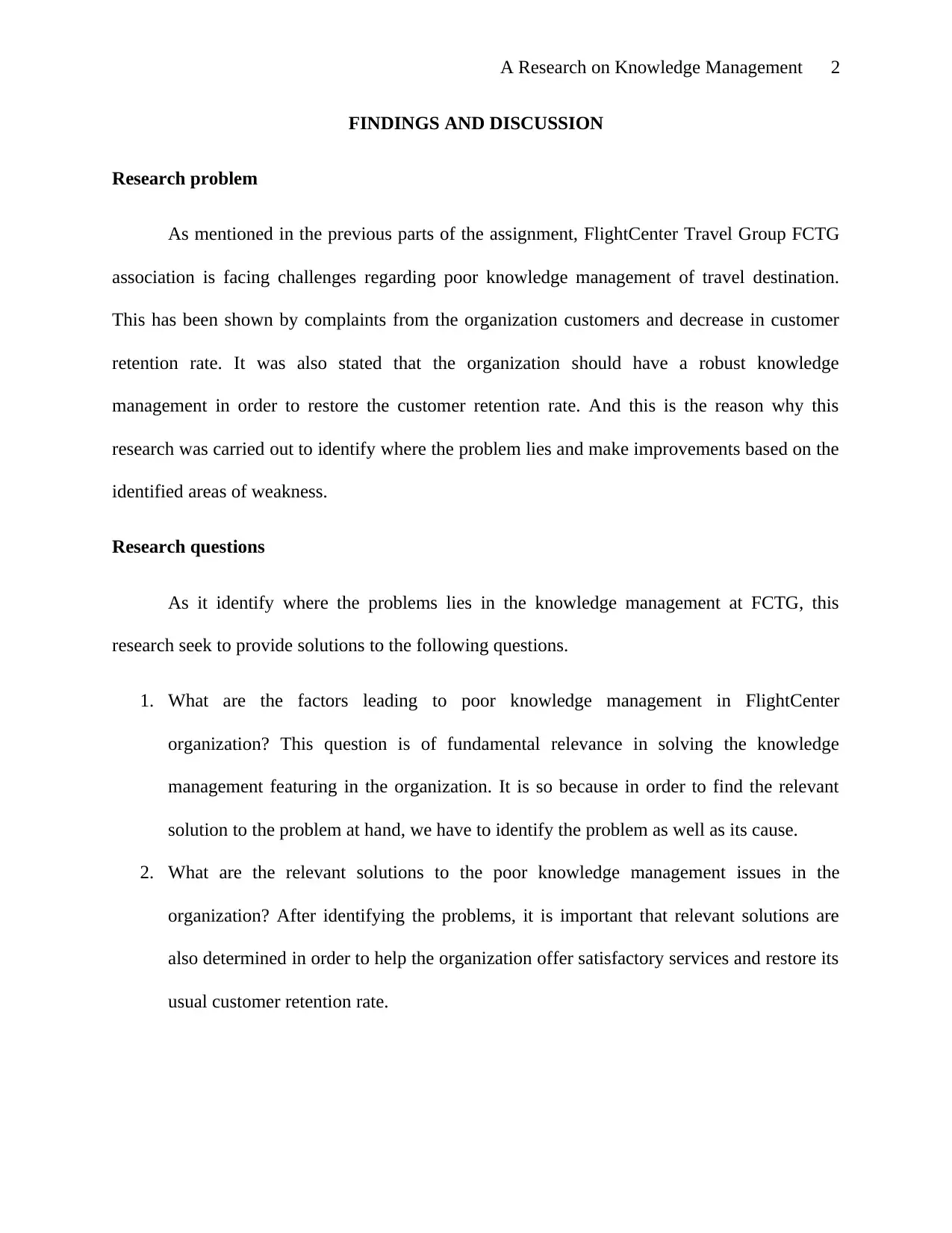
A Research on Knowledge Management 2
FINDINGS AND DISCUSSION
Research problem
As mentioned in the previous parts of the assignment, FlightCenter Travel Group FCTG
association is facing challenges regarding poor knowledge management of travel destination.
This has been shown by complaints from the organization customers and decrease in customer
retention rate. It was also stated that the organization should have a robust knowledge
management in order to restore the customer retention rate. And this is the reason why this
research was carried out to identify where the problem lies and make improvements based on the
identified areas of weakness.
Research questions
As it identify where the problems lies in the knowledge management at FCTG, this
research seek to provide solutions to the following questions.
1. What are the factors leading to poor knowledge management in FlightCenter
organization? This question is of fundamental relevance in solving the knowledge
management featuring in the organization. It is so because in order to find the relevant
solution to the problem at hand, we have to identify the problem as well as its cause.
2. What are the relevant solutions to the poor knowledge management issues in the
organization? After identifying the problems, it is important that relevant solutions are
also determined in order to help the organization offer satisfactory services and restore its
usual customer retention rate.
FINDINGS AND DISCUSSION
Research problem
As mentioned in the previous parts of the assignment, FlightCenter Travel Group FCTG
association is facing challenges regarding poor knowledge management of travel destination.
This has been shown by complaints from the organization customers and decrease in customer
retention rate. It was also stated that the organization should have a robust knowledge
management in order to restore the customer retention rate. And this is the reason why this
research was carried out to identify where the problem lies and make improvements based on the
identified areas of weakness.
Research questions
As it identify where the problems lies in the knowledge management at FCTG, this
research seek to provide solutions to the following questions.
1. What are the factors leading to poor knowledge management in FlightCenter
organization? This question is of fundamental relevance in solving the knowledge
management featuring in the organization. It is so because in order to find the relevant
solution to the problem at hand, we have to identify the problem as well as its cause.
2. What are the relevant solutions to the poor knowledge management issues in the
organization? After identifying the problems, it is important that relevant solutions are
also determined in order to help the organization offer satisfactory services and restore its
usual customer retention rate.
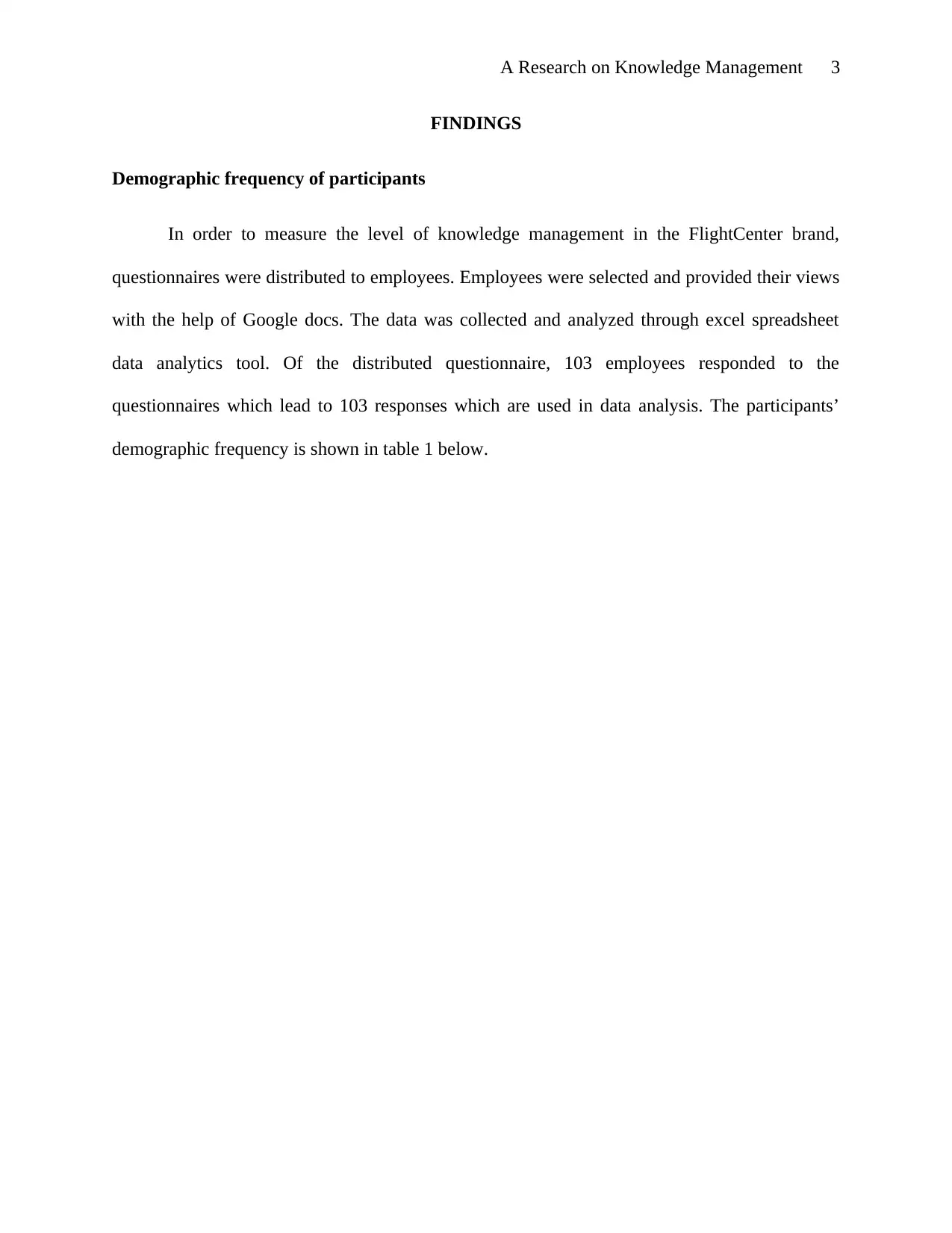
A Research on Knowledge Management 3
FINDINGS
Demographic frequency of participants
In order to measure the level of knowledge management in the FlightCenter brand,
questionnaires were distributed to employees. Employees were selected and provided their views
with the help of Google docs. The data was collected and analyzed through excel spreadsheet
data analytics tool. Of the distributed questionnaire, 103 employees responded to the
questionnaires which lead to 103 responses which are used in data analysis. The participants’
demographic frequency is shown in table 1 below.
FINDINGS
Demographic frequency of participants
In order to measure the level of knowledge management in the FlightCenter brand,
questionnaires were distributed to employees. Employees were selected and provided their views
with the help of Google docs. The data was collected and analyzed through excel spreadsheet
data analytics tool. Of the distributed questionnaire, 103 employees responded to the
questionnaires which lead to 103 responses which are used in data analysis. The participants’
demographic frequency is shown in table 1 below.
⊘ This is a preview!⊘
Do you want full access?
Subscribe today to unlock all pages.

Trusted by 1+ million students worldwide
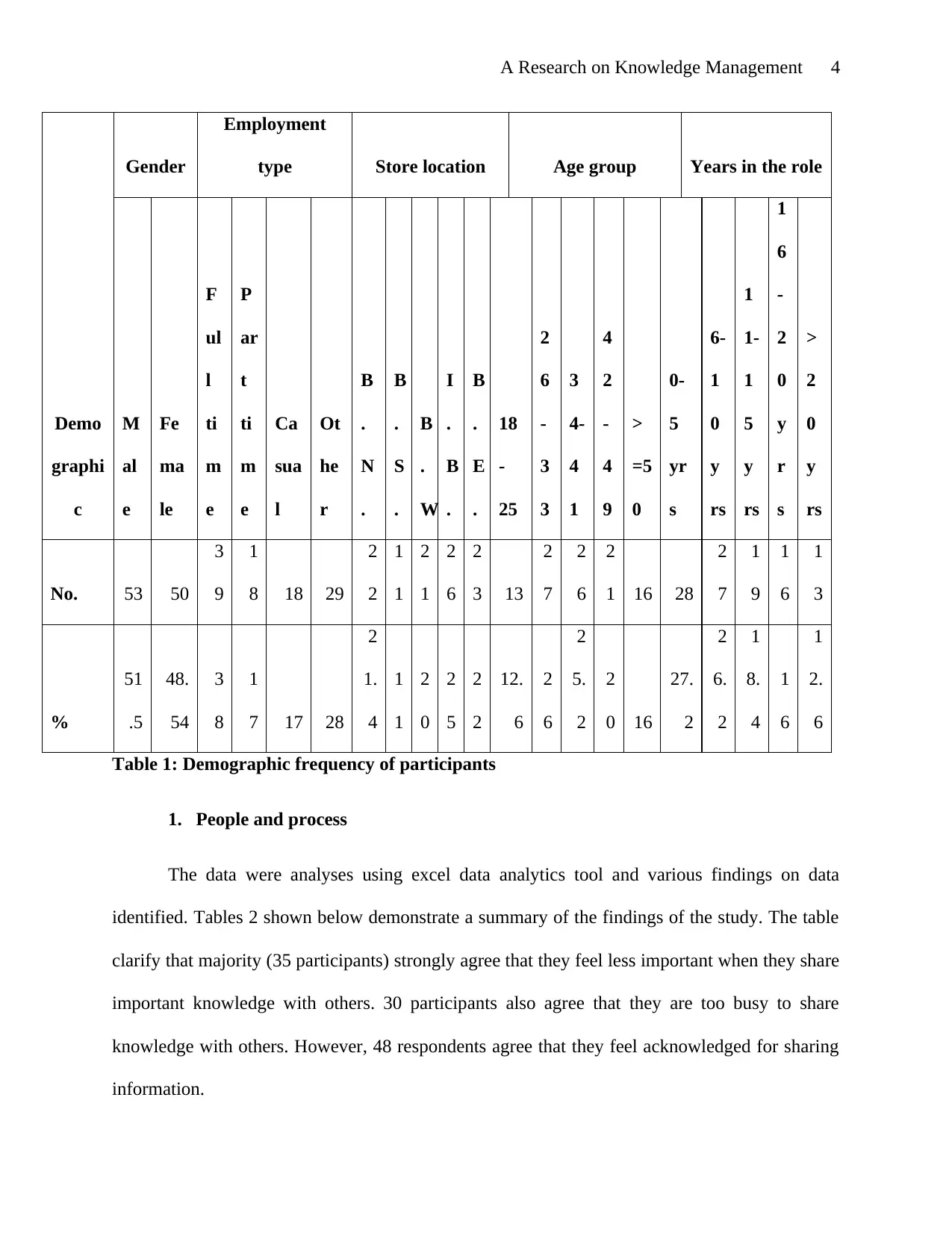
A Research on Knowledge Management 4
Demo
graphi
c
Gender
Employment
type Store location Age group Years in the role
M
al
e
Fe
ma
le
F
ul
l
ti
m
e
P
ar
t
ti
m
e
Ca
sua
l
Ot
he
r
B
.
N
.
B
.
S
.
B
.
W
I
.
B
.
B
.
E
.
18
-
25
2
6
-
3
3
3
4-
4
1
4
2
-
4
9
>
=5
0
0-
5
yr
s
6-
1
0
y
rs
1
1-
1
5
y
rs
1
6
-
2
0
y
r
s
>
2
0
y
rs
No. 53 50
3
9
1
8 18 29
2
2
1
1
2
1
2
6
2
3 13
2
7
2
6
2
1 16 28
2
7
1
9
1
6
1
3
%
51
.5
48.
54
3
8
1
7 17 28
2
1.
4
1
1
2
0
2
5
2
2
12.
6
2
6
2
5.
2
2
0 16
27.
2
2
6.
2
1
8.
4
1
6
1
2.
6
Table 1: Demographic frequency of participants
1. People and process
The data were analyses using excel data analytics tool and various findings on data
identified. Tables 2 shown below demonstrate a summary of the findings of the study. The table
clarify that majority (35 participants) strongly agree that they feel less important when they share
important knowledge with others. 30 participants also agree that they are too busy to share
knowledge with others. However, 48 respondents agree that they feel acknowledged for sharing
information.
Demo
graphi
c
Gender
Employment
type Store location Age group Years in the role
M
al
e
Fe
ma
le
F
ul
l
ti
m
e
P
ar
t
ti
m
e
Ca
sua
l
Ot
he
r
B
.
N
.
B
.
S
.
B
.
W
I
.
B
.
B
.
E
.
18
-
25
2
6
-
3
3
3
4-
4
1
4
2
-
4
9
>
=5
0
0-
5
yr
s
6-
1
0
y
rs
1
1-
1
5
y
rs
1
6
-
2
0
y
r
s
>
2
0
y
rs
No. 53 50
3
9
1
8 18 29
2
2
1
1
2
1
2
6
2
3 13
2
7
2
6
2
1 16 28
2
7
1
9
1
6
1
3
%
51
.5
48.
54
3
8
1
7 17 28
2
1.
4
1
1
2
0
2
5
2
2
12.
6
2
6
2
5.
2
2
0 16
27.
2
2
6.
2
1
8.
4
1
6
1
2.
6
Table 1: Demographic frequency of participants
1. People and process
The data were analyses using excel data analytics tool and various findings on data
identified. Tables 2 shown below demonstrate a summary of the findings of the study. The table
clarify that majority (35 participants) strongly agree that they feel less important when they share
important knowledge with others. 30 participants also agree that they are too busy to share
knowledge with others. However, 48 respondents agree that they feel acknowledged for sharing
information.
Paraphrase This Document
Need a fresh take? Get an instant paraphrase of this document with our AI Paraphraser
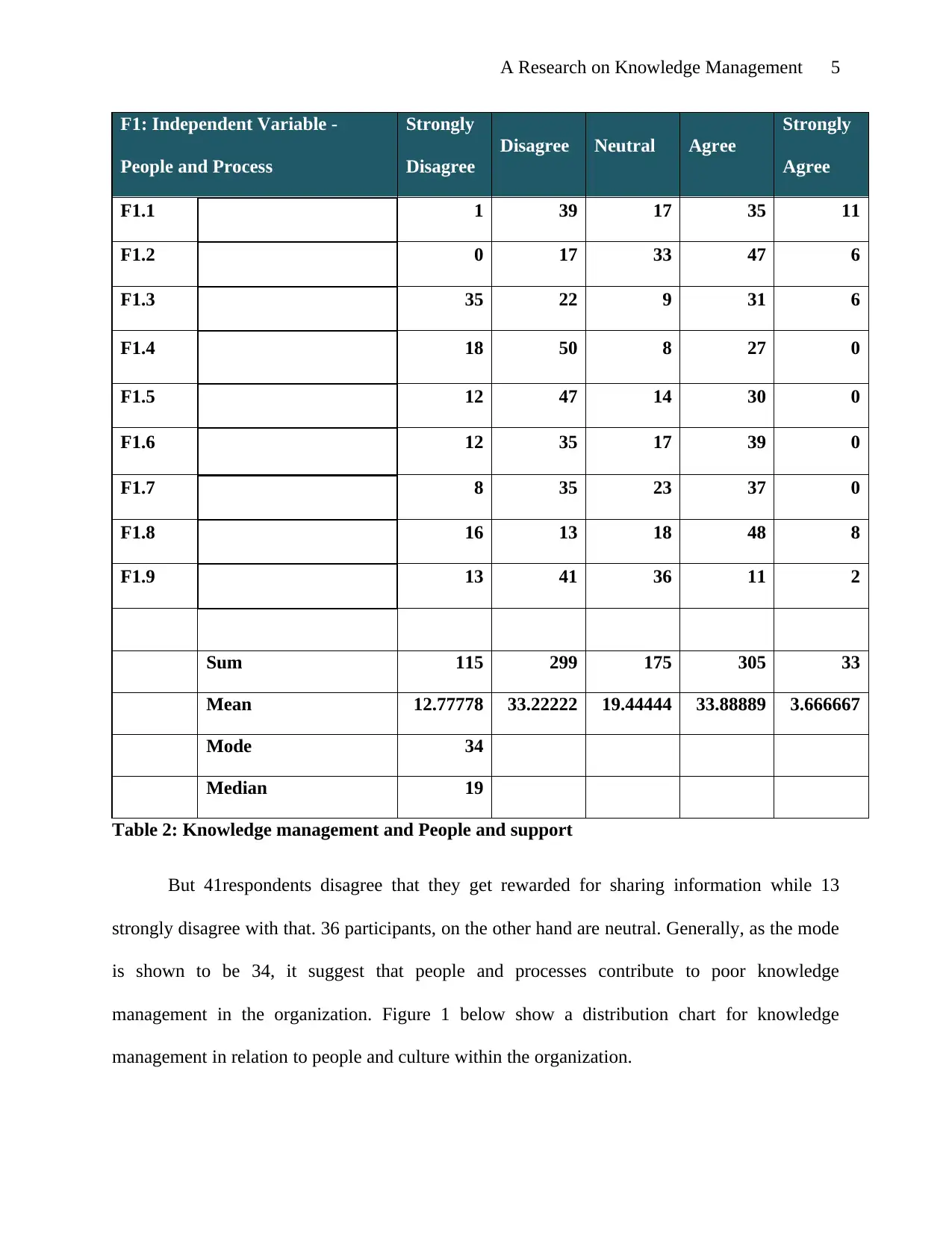
A Research on Knowledge Management 5
F1: Independent Variable -
People and Process
Strongly
Disagree
Disagree Neutral Agree
Strongly
Agree
F1.1 1 39 17 35 11
F1.2 0 17 33 47 6
F1.3 35 22 9 31 6
F1.4 18 50 8 27 0
F1.5 12 47 14 30 0
F1.6 12 35 17 39 0
F1.7 8 35 23 37 0
F1.8 16 13 18 48 8
F1.9 13 41 36 11 2
Sum 115 299 175 305 33
Mean 12.77778 33.22222 19.44444 33.88889 3.666667
Mode 34
Median 19
Table 2: Knowledge management and People and support
But 41respondents disagree that they get rewarded for sharing information while 13
strongly disagree with that. 36 participants, on the other hand are neutral. Generally, as the mode
is shown to be 34, it suggest that people and processes contribute to poor knowledge
management in the organization. Figure 1 below show a distribution chart for knowledge
management in relation to people and culture within the organization.
F1: Independent Variable -
People and Process
Strongly
Disagree
Disagree Neutral Agree
Strongly
Agree
F1.1 1 39 17 35 11
F1.2 0 17 33 47 6
F1.3 35 22 9 31 6
F1.4 18 50 8 27 0
F1.5 12 47 14 30 0
F1.6 12 35 17 39 0
F1.7 8 35 23 37 0
F1.8 16 13 18 48 8
F1.9 13 41 36 11 2
Sum 115 299 175 305 33
Mean 12.77778 33.22222 19.44444 33.88889 3.666667
Mode 34
Median 19
Table 2: Knowledge management and People and support
But 41respondents disagree that they get rewarded for sharing information while 13
strongly disagree with that. 36 participants, on the other hand are neutral. Generally, as the mode
is shown to be 34, it suggest that people and processes contribute to poor knowledge
management in the organization. Figure 1 below show a distribution chart for knowledge
management in relation to people and culture within the organization.
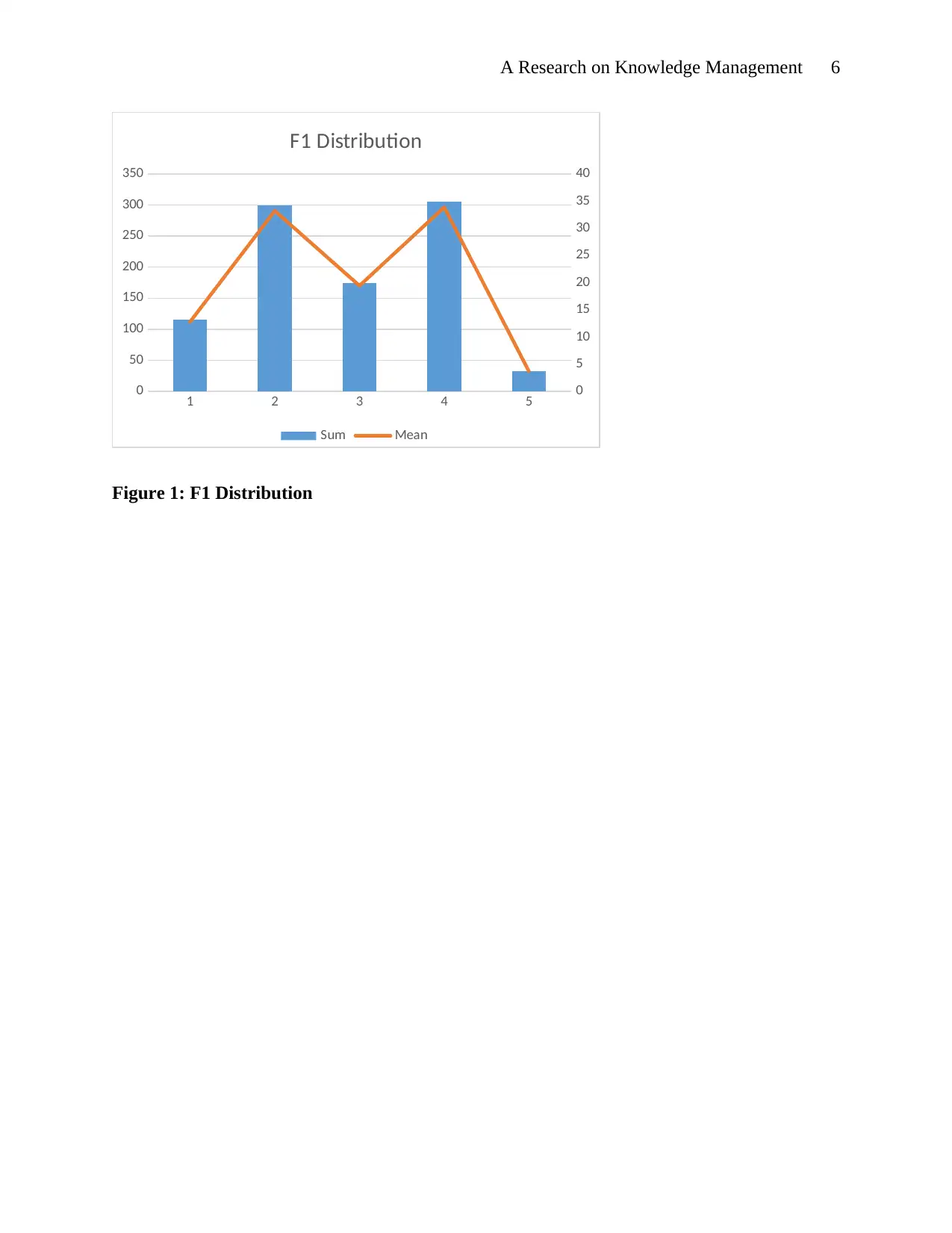
A Research on Knowledge Management 6
1 2 3 4 5
0
50
100
150
200
250
300
350
0
5
10
15
20
25
30
35
40
F1 Distribution
Sum Mean
Figure 1: F1 Distribution
1 2 3 4 5
0
50
100
150
200
250
300
350
0
5
10
15
20
25
30
35
40
F1 Distribution
Sum Mean
Figure 1: F1 Distribution
⊘ This is a preview!⊘
Do you want full access?
Subscribe today to unlock all pages.

Trusted by 1+ million students worldwide
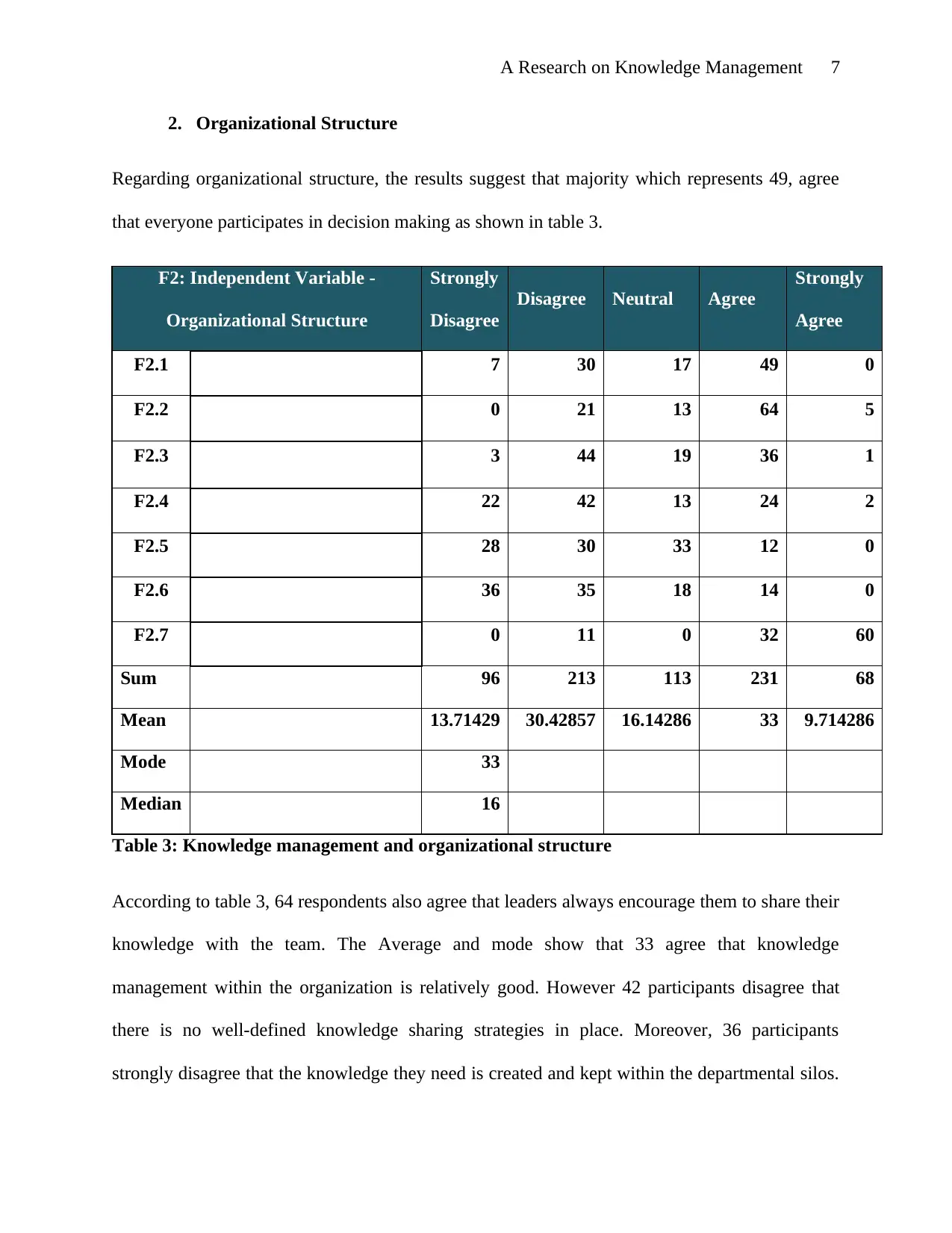
A Research on Knowledge Management 7
2. Organizational Structure
Regarding organizational structure, the results suggest that majority which represents 49, agree
that everyone participates in decision making as shown in table 3.
F2: Independent Variable -
Organizational Structure
Strongly
Disagree
Disagree Neutral Agree
Strongly
Agree
F2.1 7 30 17 49 0
F2.2 0 21 13 64 5
F2.3 3 44 19 36 1
F2.4 22 42 13 24 2
F2.5 28 30 33 12 0
F2.6 36 35 18 14 0
F2.7 0 11 0 32 60
Sum 96 213 113 231 68
Mean 13.71429 30.42857 16.14286 33 9.714286
Mode 33
Median 16
Table 3: Knowledge management and organizational structure
According to table 3, 64 respondents also agree that leaders always encourage them to share their
knowledge with the team. The Average and mode show that 33 agree that knowledge
management within the organization is relatively good. However 42 participants disagree that
there is no well-defined knowledge sharing strategies in place. Moreover, 36 participants
strongly disagree that the knowledge they need is created and kept within the departmental silos.
2. Organizational Structure
Regarding organizational structure, the results suggest that majority which represents 49, agree
that everyone participates in decision making as shown in table 3.
F2: Independent Variable -
Organizational Structure
Strongly
Disagree
Disagree Neutral Agree
Strongly
Agree
F2.1 7 30 17 49 0
F2.2 0 21 13 64 5
F2.3 3 44 19 36 1
F2.4 22 42 13 24 2
F2.5 28 30 33 12 0
F2.6 36 35 18 14 0
F2.7 0 11 0 32 60
Sum 96 213 113 231 68
Mean 13.71429 30.42857 16.14286 33 9.714286
Mode 33
Median 16
Table 3: Knowledge management and organizational structure
According to table 3, 64 respondents also agree that leaders always encourage them to share their
knowledge with the team. The Average and mode show that 33 agree that knowledge
management within the organization is relatively good. However 42 participants disagree that
there is no well-defined knowledge sharing strategies in place. Moreover, 36 participants
strongly disagree that the knowledge they need is created and kept within the departmental silos.
Paraphrase This Document
Need a fresh take? Get an instant paraphrase of this document with our AI Paraphraser
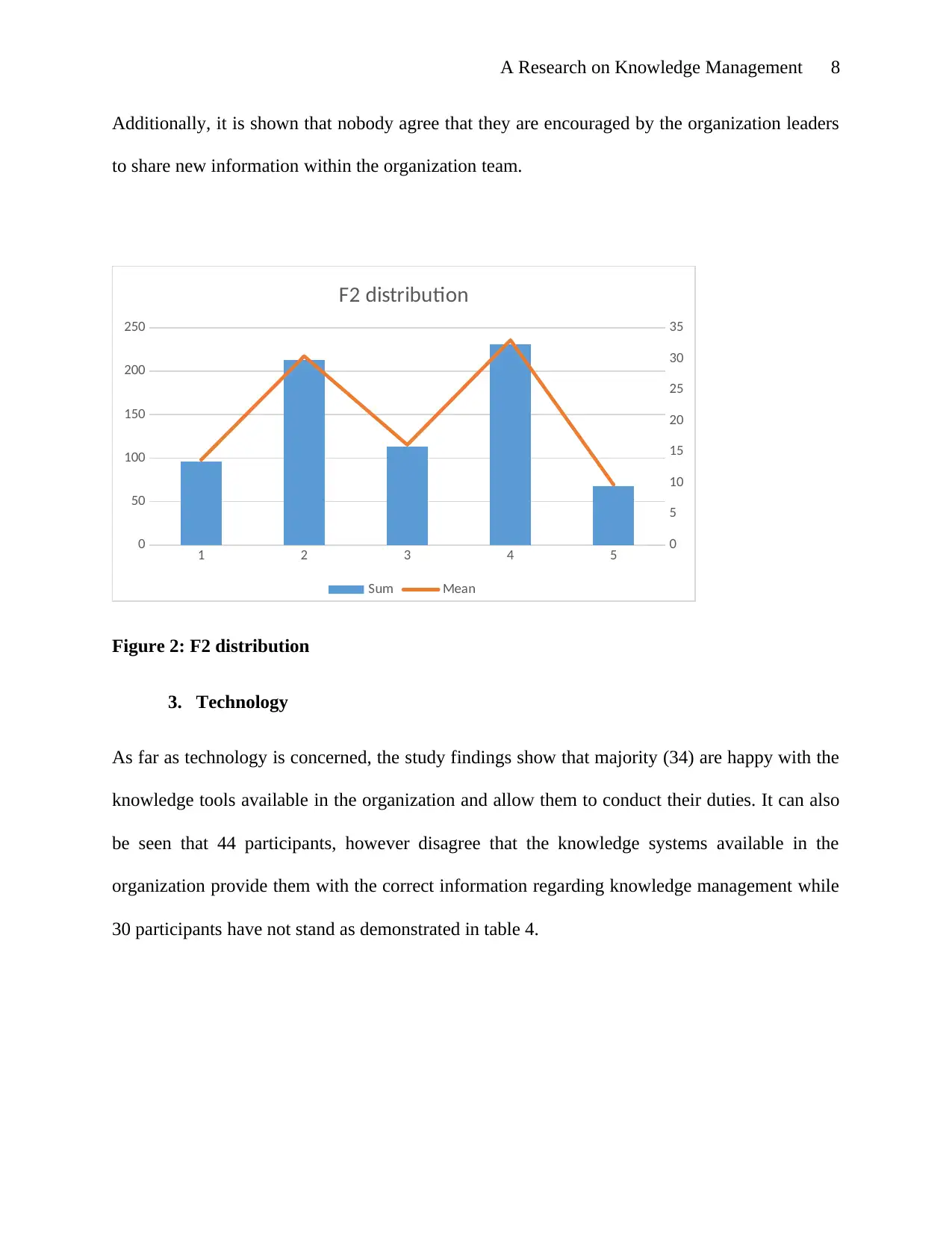
A Research on Knowledge Management 8
Additionally, it is shown that nobody agree that they are encouraged by the organization leaders
to share new information within the organization team.
1 2 3 4 5
0
50
100
150
200
250
0
5
10
15
20
25
30
35
F2 distribution
Sum Mean
Figure 2: F2 distribution
3. Technology
As far as technology is concerned, the study findings show that majority (34) are happy with the
knowledge tools available in the organization and allow them to conduct their duties. It can also
be seen that 44 participants, however disagree that the knowledge systems available in the
organization provide them with the correct information regarding knowledge management while
30 participants have not stand as demonstrated in table 4.
Additionally, it is shown that nobody agree that they are encouraged by the organization leaders
to share new information within the organization team.
1 2 3 4 5
0
50
100
150
200
250
0
5
10
15
20
25
30
35
F2 distribution
Sum Mean
Figure 2: F2 distribution
3. Technology
As far as technology is concerned, the study findings show that majority (34) are happy with the
knowledge tools available in the organization and allow them to conduct their duties. It can also
be seen that 44 participants, however disagree that the knowledge systems available in the
organization provide them with the correct information regarding knowledge management while
30 participants have not stand as demonstrated in table 4.
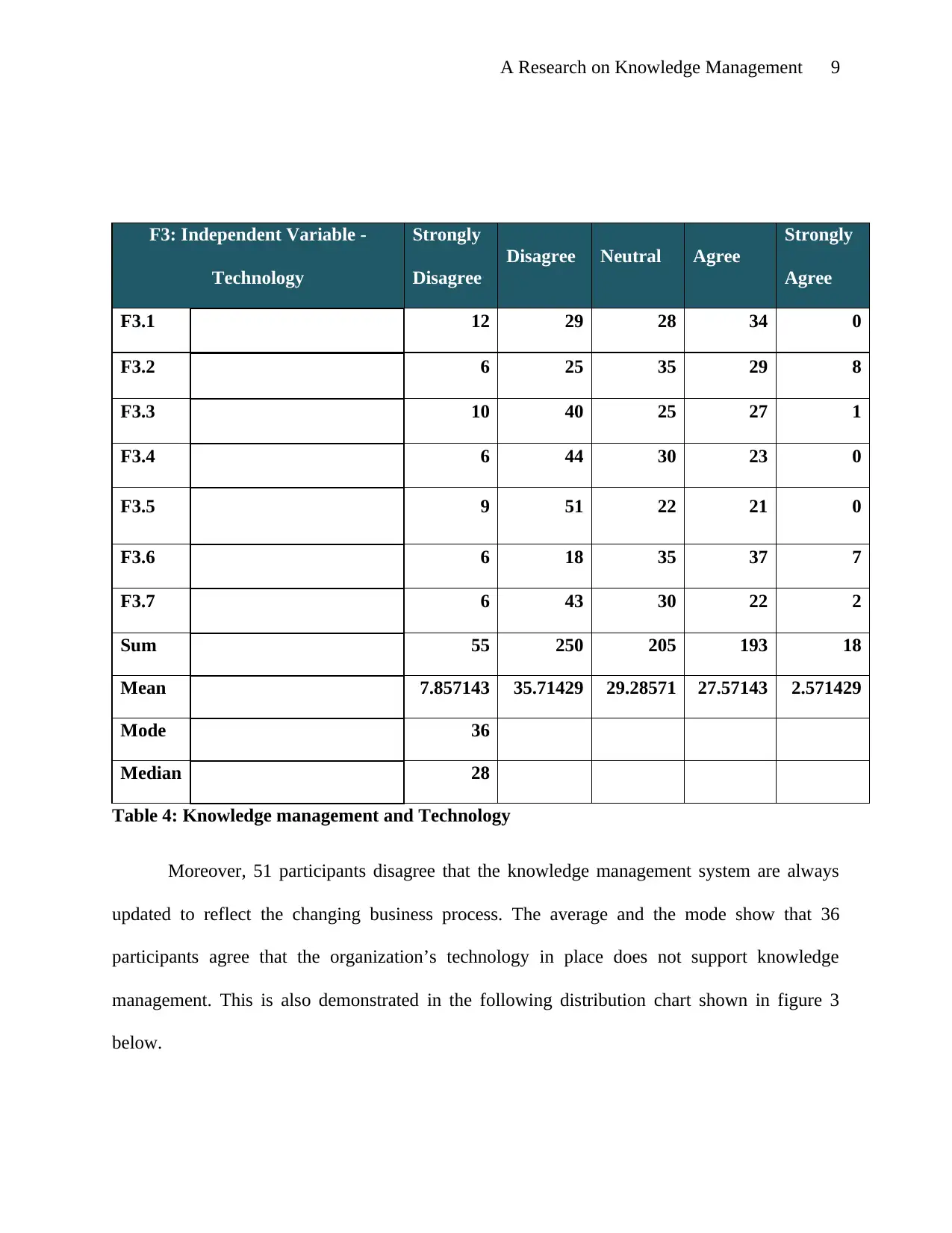
A Research on Knowledge Management 9
F3: Independent Variable -
Technology
Strongly
Disagree
Disagree Neutral Agree
Strongly
Agree
F3.1 12 29 28 34 0
F3.2 6 25 35 29 8
F3.3 10 40 25 27 1
F3.4 6 44 30 23 0
F3.5 9 51 22 21 0
F3.6 6 18 35 37 7
F3.7 6 43 30 22 2
Sum 55 250 205 193 18
Mean 7.857143 35.71429 29.28571 27.57143 2.571429
Mode 36
Median 28
Table 4: Knowledge management and Technology
Moreover, 51 participants disagree that the knowledge management system are always
updated to reflect the changing business process. The average and the mode show that 36
participants agree that the organization’s technology in place does not support knowledge
management. This is also demonstrated in the following distribution chart shown in figure 3
below.
F3: Independent Variable -
Technology
Strongly
Disagree
Disagree Neutral Agree
Strongly
Agree
F3.1 12 29 28 34 0
F3.2 6 25 35 29 8
F3.3 10 40 25 27 1
F3.4 6 44 30 23 0
F3.5 9 51 22 21 0
F3.6 6 18 35 37 7
F3.7 6 43 30 22 2
Sum 55 250 205 193 18
Mean 7.857143 35.71429 29.28571 27.57143 2.571429
Mode 36
Median 28
Table 4: Knowledge management and Technology
Moreover, 51 participants disagree that the knowledge management system are always
updated to reflect the changing business process. The average and the mode show that 36
participants agree that the organization’s technology in place does not support knowledge
management. This is also demonstrated in the following distribution chart shown in figure 3
below.
⊘ This is a preview!⊘
Do you want full access?
Subscribe today to unlock all pages.

Trusted by 1+ million students worldwide
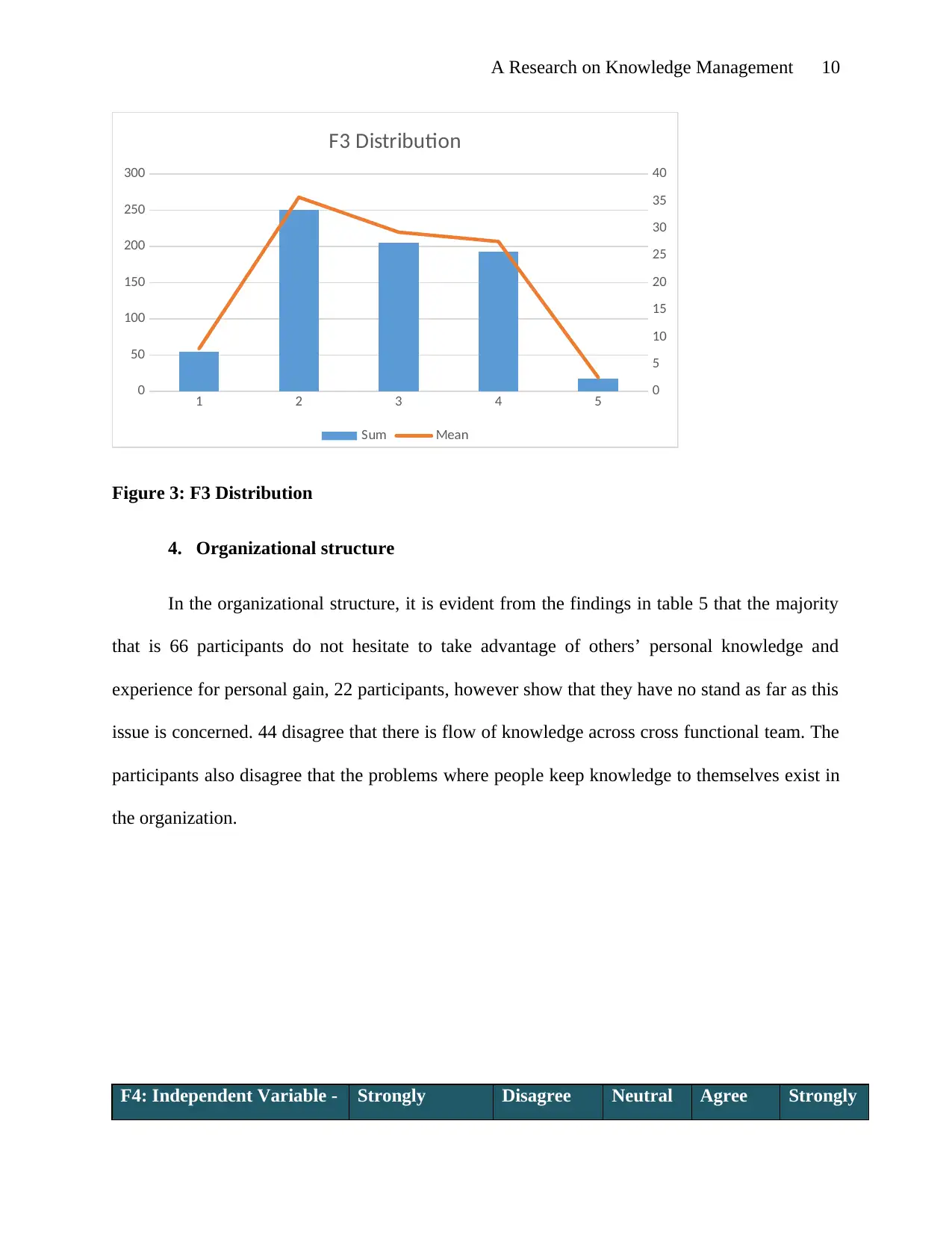
A Research on Knowledge Management 10
1 2 3 4 5
0
50
100
150
200
250
300
0
5
10
15
20
25
30
35
40
F3 Distribution
Sum Mean
Figure 3: F3 Distribution
4. Organizational structure
In the organizational structure, it is evident from the findings in table 5 that the majority
that is 66 participants do not hesitate to take advantage of others’ personal knowledge and
experience for personal gain, 22 participants, however show that they have no stand as far as this
issue is concerned. 44 disagree that there is flow of knowledge across cross functional team. The
participants also disagree that the problems where people keep knowledge to themselves exist in
the organization.
F4: Independent Variable - Strongly Disagree Neutral Agree Strongly
1 2 3 4 5
0
50
100
150
200
250
300
0
5
10
15
20
25
30
35
40
F3 Distribution
Sum Mean
Figure 3: F3 Distribution
4. Organizational structure
In the organizational structure, it is evident from the findings in table 5 that the majority
that is 66 participants do not hesitate to take advantage of others’ personal knowledge and
experience for personal gain, 22 participants, however show that they have no stand as far as this
issue is concerned. 44 disagree that there is flow of knowledge across cross functional team. The
participants also disagree that the problems where people keep knowledge to themselves exist in
the organization.
F4: Independent Variable - Strongly Disagree Neutral Agree Strongly
Paraphrase This Document
Need a fresh take? Get an instant paraphrase of this document with our AI Paraphraser
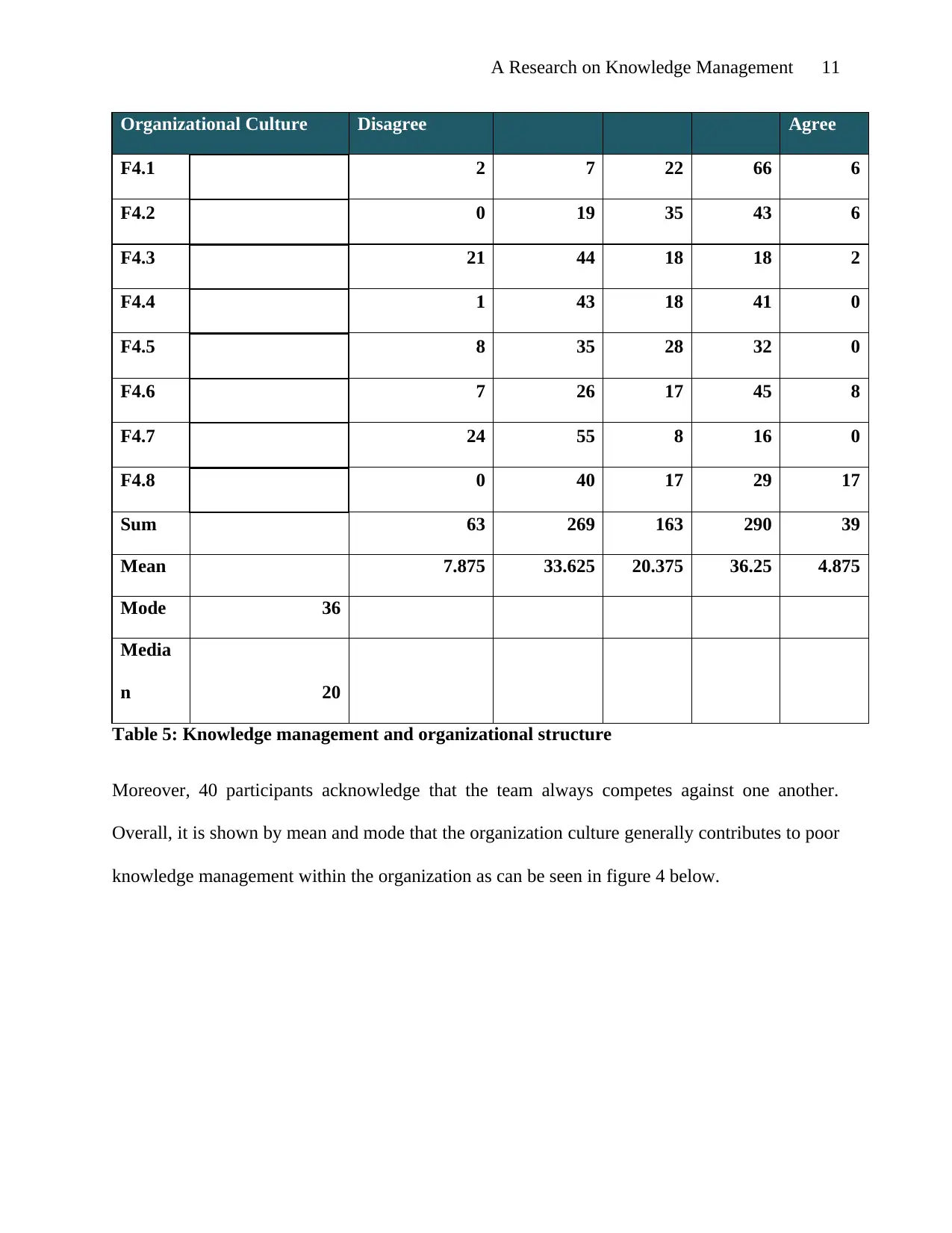
A Research on Knowledge Management 11
Organizational Culture Disagree Agree
F4.1 2 7 22 66 6
F4.2 0 19 35 43 6
F4.3 21 44 18 18 2
F4.4 1 43 18 41 0
F4.5 8 35 28 32 0
F4.6 7 26 17 45 8
F4.7 24 55 8 16 0
F4.8 0 40 17 29 17
Sum 63 269 163 290 39
Mean 7.875 33.625 20.375 36.25 4.875
Mode 36
Media
n 20
Table 5: Knowledge management and organizational structure
Moreover, 40 participants acknowledge that the team always competes against one another.
Overall, it is shown by mean and mode that the organization culture generally contributes to poor
knowledge management within the organization as can be seen in figure 4 below.
Organizational Culture Disagree Agree
F4.1 2 7 22 66 6
F4.2 0 19 35 43 6
F4.3 21 44 18 18 2
F4.4 1 43 18 41 0
F4.5 8 35 28 32 0
F4.6 7 26 17 45 8
F4.7 24 55 8 16 0
F4.8 0 40 17 29 17
Sum 63 269 163 290 39
Mean 7.875 33.625 20.375 36.25 4.875
Mode 36
Media
n 20
Table 5: Knowledge management and organizational structure
Moreover, 40 participants acknowledge that the team always competes against one another.
Overall, it is shown by mean and mode that the organization culture generally contributes to poor
knowledge management within the organization as can be seen in figure 4 below.
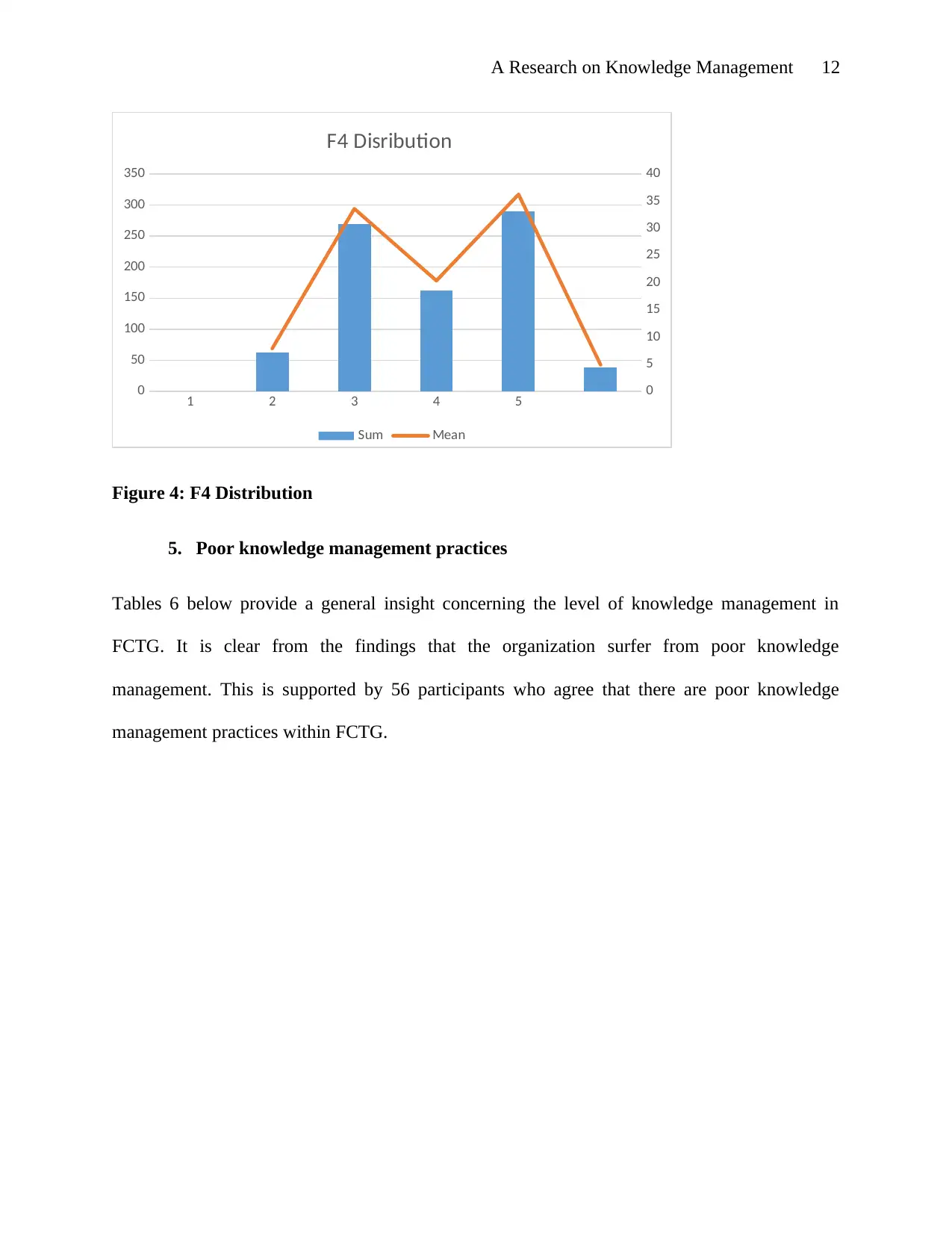
A Research on Knowledge Management 12
1 2 3 4 5
0
50
100
150
200
250
300
350
0
5
10
15
20
25
30
35
40
F4 Disribution
Sum Mean
Figure 4: F4 Distribution
5. Poor knowledge management practices
Tables 6 below provide a general insight concerning the level of knowledge management in
FCTG. It is clear from the findings that the organization surfer from poor knowledge
management. This is supported by 56 participants who agree that there are poor knowledge
management practices within FCTG.
1 2 3 4 5
0
50
100
150
200
250
300
350
0
5
10
15
20
25
30
35
40
F4 Disribution
Sum Mean
Figure 4: F4 Distribution
5. Poor knowledge management practices
Tables 6 below provide a general insight concerning the level of knowledge management in
FCTG. It is clear from the findings that the organization surfer from poor knowledge
management. This is supported by 56 participants who agree that there are poor knowledge
management practices within FCTG.
⊘ This is a preview!⊘
Do you want full access?
Subscribe today to unlock all pages.

Trusted by 1+ million students worldwide
1 out of 19
Related Documents
Your All-in-One AI-Powered Toolkit for Academic Success.
+13062052269
info@desklib.com
Available 24*7 on WhatsApp / Email
![[object Object]](/_next/static/media/star-bottom.7253800d.svg)
Unlock your academic potential
Copyright © 2020–2026 A2Z Services. All Rights Reserved. Developed and managed by ZUCOL.





